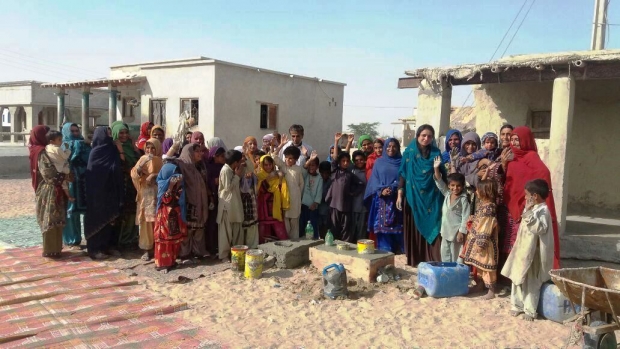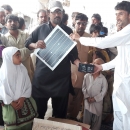Grants :: Small Grant Facilities :: Demonstrating environment-friendly practices in Chandi village of Kalmat in District Gawadar
Demonstrating environment-friendly practices in Chandi village of Kalmat in District Gawadar

Fuel efficient stove demonstration © MFF Pakistan
Objectives
Background
Kalmat is a very scattered and backward Union Council of Tehsil Pasni, District Gwadar with the population of 6,648 inhabitants and about 96% of the male populace of Kalmat is engaged in fishing and fish related activities. The project has been implemented in village Chandi of Kalmat area along the Balochistan coast. The village Chandi lacks basic facilities, like drinking water, electricity, health and hygiene, school and road infrastructure. The women folks in Chandi village are largely responsible for household affairs as well as responsible for collection of fuelwood and fodder for livestock. Their involvement in income generating activities is restricted to traditional embroidery. The women access to education is almost absent. Their role in decision-making processes is negligible and their income levels are considered as zero.
The area is rich in biodiversity and availability of variety of commercial fish and shell fish species. Due to remoteness access to market and capacity in post-harvest fish catch management facilities are limited or lacking resulting in substantial losses in quality and value of fish catch. The fishermen of the area use traditional boats locally called Horas. But those fishing crafts and their storages are very primitive and inadequate with no insulation and proper preservation facilities. At the same time, due to absence of fish handling equipment and insufficient knowledge on fish catch preservation techniques, post-harvest landing, transportation and processing approximately 50% value of the catch is lost. Due to these issues, it results into low payments and resultantly it impacts the livelihoods of the local fishermen.
Under the project improvement in technical skills and capacity of fishermen in catch preservation and processing on-board at sea, at landing site through upgradation of a fish purchase unit and transportation to market has been envisaged in order to maintain catch as per the needs of local and international market demand. The main purpose of project is to reduce the post-harvest losses of fisherfolk community of Chandi in Kalmat village. The project also intends to build capacity and support women folks in adoption of alternate energy options so as to reduce their workload and enhance their role in productive activities through time saving and during night time. The lesson learnt from the project will be documented and disseminated widely.
Target beneficiaries
The project beneficiaries targeted 350 fisher folk of the Chandni village who will get good competitive price of their catch as a result of improved fish catch quality. In addition, 50 households of the village will benefit from adoption of alternate energy options including, fuel efficient stoves and LED solar lights. The project will contribute to reduction of women workload in fuel wood collection and they will be able to use their saved time in productive activities. The less smoke from the energy efficient stoves will bring positive health impacts on overall health of women. Further, provision of LED lights will bring a change in life and create opportunity for women to use night hours in traditional embroidery to support household earning. The village will be exposed to interventions from other governmental, non-governmental agencies and civil society.
Outputs
- Local capacities strengthened In fish catch handling practices through training and upgradation of a fish purchase unit.
- Local women trained in adoption of energy conservation measures and facilitated in non-productive and productive activities at household level.
- Capacities of local stakeholders enhanced in Eco-DRR and project lessons documented and disseminated widely.
Accomplishments and challenges
Achievements:
- Capacities of 50 fishermen build through training in improved fish catch handling and quality assurance of their catch for better market value.
- Training organized for 10 local youth in fisheries related employable skills i.e. fish and shell fish processing, grading and packing.
- 10 women trained as Master Trainers in making of fuel efficient stoves to support adoption of energy efficient stove by 50 households and reduce burden on local natural resource and women reduced folks and saving women from possible fire injuries during cooking.
- 50 households provided with LED solar lights to help women utilize their available time more productively.
- One fish purchasing unit upgraded in Chandi village.
- Knowledge and capacity of four local stakeholders built in Eco-DRR.
- Project stories and lessons documented and disseminated widely through various forums.
Contributions to cross-cutting themes
- The project mainstreams gender consideration and provided equal opportunity to men and women for participation of project activities.
- The project addressed gender gaps by empowering the local women and involving them in income generating activities.
- The use of fuel efficient stoves and solar lights is contributing to household health and reducing carbon emissions.
- The project has contributed to building knowledge and capacity of relevant local stakeholders in Eco-DRR and adoption of ecosystem based approaches towards addressing disaster risks.
Lessons Learned
Women actively participated in training on making of fuel efficient stoves. Before the project, the women participation was largely absent due to male dominated approach; however; the project has contributed in minimizing gender gap and empowering of local women. Under the project, the women of the whole village have been trained and supported in adoption of fuel efficient stoves. A female trainer was engaged for training which encouraged participation of women in the project and its participatory initiatives.
Project Facts
Country
Location
Chandi Village, Kalmat, Gawadar District
Topic
Duration
15th Apr 2016 to 14th Jan 2017
MFF Grant Amount
Demonstrating environment-friendly practices in Chandi village of Kalmat in District Gawadar
Co-financing Partner
Executive Director, PEACE
Implementing Partner
Executive Director, PEACE
Mr.Nazir Ahmed
Executive Director, PEACE
Public Engagement & Community Empowerment (PEACE) Gwadar, New Town Phase-1, Block # M.15, near New Town housing scheme office, Balochistan, Pakistan
Tel: 0321-7559682
E-mail: peace.gwd.org@gmail.com
